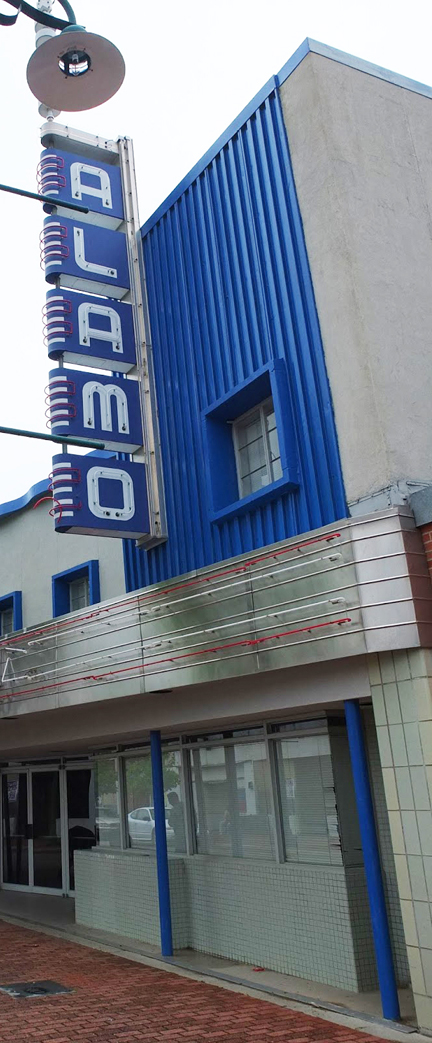Jackson seeks movie theater: City-private partnership may be right ticket
LaReeca Rucker:
The Clarion-Ledger
For almost 100 years, Jackson was a city with movie theaters. The Century, Garden, Hippodrome, Dixie, Alamo, Istrione, Majestic, Paramount, Buck, Pix, Ray, Joy and Ritz were just some of the establishments that once drew patrons to silent films, talkies and drive-in movies from the early 1900s until their final demise before the turn of the 21st century.

Now there are serious efforts under way to bring a movie theater back to Jackson.
Bennie Hopkins, director of Planning and Development for the city of Jackson, said it's a topic frequently talked about in his office "because we hear our clients and constituents asking why we don't have a theater."
Hopkins said city leaders have been aggressively recruiting a movie theater since 2009. Some representatives traveled to the International Council of Shopping Centers convention to learn how to proceed, and they have made calls to Regal and other movie companies.
"Based on information we've gathered, it will take the city partnering with the right private developer," he said.
He used Highland Village's Whole Foods Market project as an example.
"We may have incentive packages for them," he said. "There is a possibility that we may have grants."
"The fact that there are no longer any movie houses within the corporate limits of Jackson reflects white flight to the suburbs, the convenience of suburban theaters in Rankin and Madison counties, and the continuing fear of crime in Jackson," said Jerry Dallas, a retired history professor at Delta State University who grew up in Jackson and graduated from Provine High School in 1959.
"A single-screen theater will probably not be able to survive anywhere," said Dallas, whose fond memories of going to the downtown picture shows led him to write a paper called "Movie Theaters in Twentieth-Century Jackson" that was published on the Mississippi Department of Archives and History website.
"First of all, you need a good, safe, secure, and attractive location to draw in the more affluent suburban crowd. The theater building, itself, should be inviting enough to make people want to come inside. For a theater to succeed, I also think that it should be located close to other attractions and amusements."
However, given the right location and intelligent management, Dallas believes a multiplex theater could be financially successful in Jackson.
"But something has to be done to allay the not-altogether-invalid fear of crime in Jackson," he said.
Malcolm White, executive director of the Mississippi Arts Commission, said whether the city will get a movie theater is a private enterprise question.
"Frankly, if there was a market for a theater inside the city limits and money to be made, it would already be there," he said. "I think there are many cities of our size that have a theater and perhaps even multiple theaters, but they have a different population."
White said there is a small and growing audience for art films and film festivals in Jackson, and there has been talk of revitalizing the old Pix/Capri Theatre in Fondren as a place for them.
Ward Emling, director of the Mississippi Film Office, said luring a theater to Jackson is a topic that comes up every once in a while among city leaders.
"It all comes down to consistent audience and profitability considerations," he said.
Hopkins said they'd like to have a theater that draws crowds like the Malco Paradiso Theatre in Memphis.
"A lot of people look at Jackson as the smaller Memphis," he said. "The Paradiso is a destination theater for a lot of people in the surrounding suburbs. They may go to the theater and wind up downtown on Beale Street afterward. We are hoping we can have something similar to that. We certainly believe it would work for the fact that it would be the only theater in the city of Jackson."
Jimmy Tashie, executive vice president of the Memphis-based Malaco Theatres chain, said theater companies look at the overall population within a metro area when deciding whether to locate there.
"They want to know how many families live around a particular growth corridor," he said. "Since young people go to the movies more than older people, we look closely at where schools are being built."
Restaurants also play an important part in site selection, Tashie said.
"Eating out and going to the movies is a natural," he said. "We like to locate close to national chains, as well as local eating establishments."
"Personally, I don't believe that it's that unusual for a city, even one as large as Jackson, to not have a cinema," Tashie said. "In recent years, the trend has been to locate in suburbs, closer to where the populations are moving and where more land is available."
To lure theaters, Tashie said some cities create entertainment districts and impose a minimal tax on businesses to support incentives that could be used to entice businesses to locate in the district.
"This creates a synergy, whereby businesses benefit from each other's customers," he said. "You see this being done in cities that are revitalizing their downtowns."
Tashie said parking is also a major concern when selecting a theater site.
Curnis Upkins III, director of business development for the Hinds County Economic Development Authority, said when developers began constructing multiplex theaters in the suburbs, they probably thought Jackson was being served by the remaining theaters still located there. Then the suburban locations became stronger.
"Anyone who lives in Jackson who wants to watch a movie, that's a frustration," he said. "I've been to other cities that have synergy between a downtown movie theater and the businesses that surround it. Show your movie tickets to the restaurants, and you get discounts, or you get to park for free."
Upkins thinks construction of a theater eventually will happen.
"I think a lot of people harp on the census numbers that show that the city of Jackson has lost population over the years," he said. "(Developers) want to be able to project growth in the future.
"There are pockets of growth within the city, and so, if you have a private developer who is interested in developing a part of the city — I think that's where it's going to happen — to start identifying these pockets of growth in the city and see if they will support a movie theater."
Did you know?
Jackson movie theater history from Jerry Dallas' paper Movie Theaters in Twentieth-Century Jackson.
• Writer Richard Wright worked briefly at the Alamo Theatre on Farish Street in 1925. While there, he stole $50 in a ticket scam, enabling him to escape Jackson's threatening racial scene and his grandmother's religiously stifling home. (From "Richard Wright: A Biography" by Constance Webb.)
• When the 1926 silent film "What Price Glory" came to Jackson, one of its sound effects was the backstage firing of a .45 pistol into a lard keg filled with sand to emulate artillery fire. The audience rushed in terror from the Alamo.
• Eudora Welty grew up during the silent-movie era. One day, she went to the Istrione expecting to see a Western but instead sat with a group of other children and watched the dark and creepy "Cabinet of Dr. Caligari."
• The Lamar, a whites-only theater that opened in 1949 with a presentation of "Little Women," featured a cry room that allowed parents of small children to go to a movie without having to hire a baby-sitter.
The Clarion-Ledger


